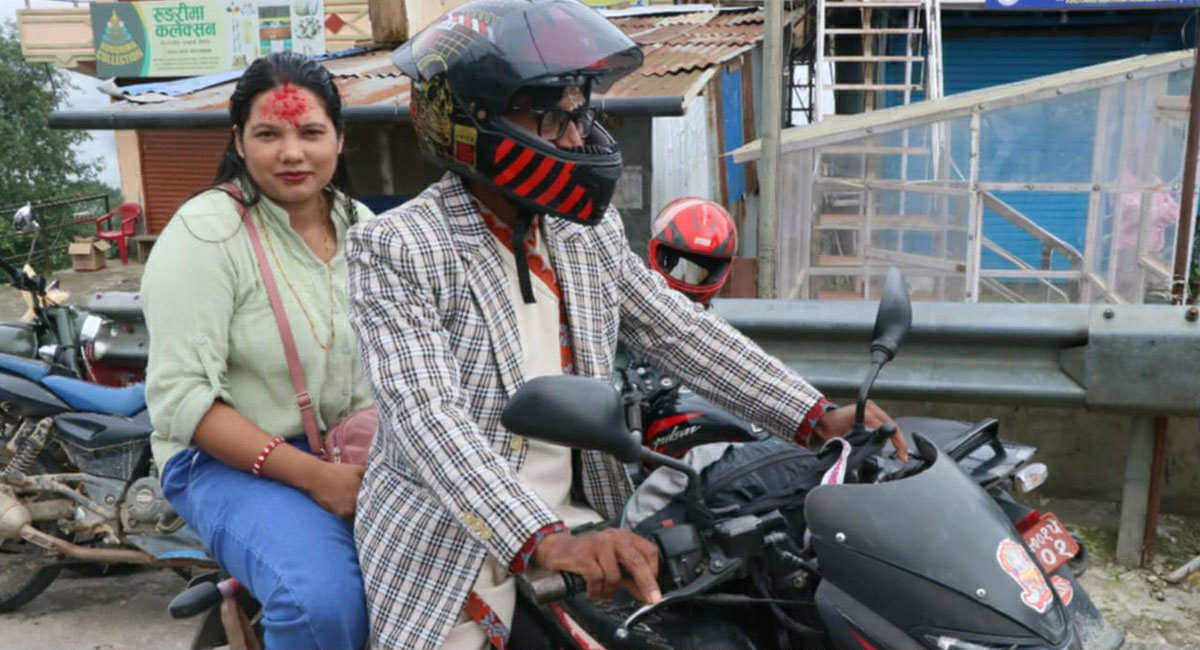

MORANG: Bhojpur, Khotang, Okhaldhunga, Solukhumbu—Across Nepal’s eastern districts, a quiet revolution is unfolding this festive season.
It is neither political nor commercial, yet it has captured the imagination of villagers, town dwellers, and social media alike. It is simple, human, and profoundly necessary: free transport services for women traveling home for Dashain and Tihar.
For Sangram Kiranti of Bhojpur, the inspiration came from a stark, recurring scene. Walking through the festive crowds last year, he saw women stranded, unable to find transportation between their parental homes and marital households.
Some were mothers struggling with small children, others patients discharged from hospitals, their faces marked by exhaustion and worry. “I realized there could be no nobler act than helping them reach home safely,” Kiranti recalls. He shared the idea with close friends, who immediately embraced it.
The campaign, now named “Dashain–Tihar: A Gift for Women”, officially kicked off on Vijayadashami, with a network of committed volunteers—Sangram Kiranti, Jeevan Kiranti, Bam Kiranti, Leela Basnet, Kopila Rai, Samika Rai, and Sangehang Rai—ready to mobilize personal vehicles for public service. What began as a small local initiative quickly gained traction. Within a day, the team was transporting women up to twenty kilometers per trip, with drivers volunteering for successive rides without hesitation.
The popularity was instantaneous. Social media posts showcasing the campaign sparked excitement across villages. Youths, inspired by the spirit of giving, joined en masse. Rain, unsafe roads, and the logistical challenges of coordinating dozens of motorcycles and a few four-wheeled vehicles did not deter them. By the campaign’s first day, over 100 women had safely reached their destinations, and the number continued to grow with each passing hour.
“This is not about going viral; it’s about serving humanity,” Kiranti emphasizes. “We know we cannot sustain this service with our own fuel and vehicles indefinitely. But the money that would otherwise be spent on gambling or entertainment during the festivals, we are redirecting toward something meaningful.”
In Khotang, Sanjay Kumar Rai started a similar initiative last year, which has now expanded to neighboring districts including Okhaldhunga and Solukhumbu. Together, these campaigns are reaching multiple municipalities—from Diktel Rupakot to Tyamkemayung, Leguwaghat, Shadananda, Arun, and Pauwadungma—ensuring women can travel safely without bearing the burden of transportation costs.
The campaign is carefully structured. Women are allowed to carry gifts weighing no more than five kilograms, ensuring fairness and safety. The initiative prioritizes those in urgent need: mothers with small children, patients recently discharged from hospitals, and economically disadvantaged women. “We do not charge any fees,” Kiranti explains. “But if anyone wishes to support our effort, whether through fuel or small donations, we gratefully accept it.” Some private organizations have already approached the volunteers to formalize collaboration, indicating that the movement may evolve into a sustained service beyond the festival season.
Local leaders have taken notice. Dan Bahadur Rai, chair of Diktel Rupakot Municipality-12, described the campaign as a model of social responsibility, providing a stark contrast to governmental or private sector inertia. Ward Chair Navaraj Rai of Diktel-1 emphasized that such efforts bring warmth not only to the festival but to the entire community. “It is the simplest gestures that leave the deepest impact,” he said.
Beyond logistics, the campaign has rekindled a spirit of communal solidarity. Villagers are now volunteering as drivers and coordinators, while social media amplifies stories of gratitude and dedication. The human stories are compelling: mothers reunited with children, elderly patients safely reaching home, and entire families able to celebrate Dashain and Tihar together—moments that might have been lost without this selfless service.
The organizers have already begun envisioning the future. There is talk of institutionalizing the campaign, ensuring it continues not just during Dashain and Tihar but whenever communities face seasonal travel challenges. It is a quiet movement, devoid of publicity stunts, yet it is already transforming lives in tangible, lasting ways.
As Nepal celebrates its most cherished festivals this year, the story of these young volunteers reminds the nation that sometimes the greatest gifts are not those wrapped in colorful paper, but those that carry people safely home. For Kiranti, Rai, and countless others, this gift is simple: humanity, driven by compassion, in motion.